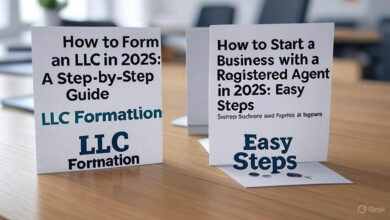Ultimate Guide to Business Formation in 2025: Start Smart, Succeed Faster

Introduction: Why Business Formation Matters More Than Ever
Starting a business is an exciting journey—but how you form your business can make or break your long-term success. Business formation is the legal process of registering and structuring your company so that it operates legally and efficiently. Whether you’re launching a small online store, a tech startup, or a consulting firm, choosing the right business structure lays the foundation for taxes, liability, branding, and funding.
In this post, you’ll discover everything you need to know about forming a business—from picking the right structure to filing the right paperwork—all broken down into easy steps for 2025 and beyond.
What Is Business Formation?
Business formation refers to the process of legally establishing your business as a recognized entity in the eyes of the government and the public. It typically includes:
- Choosing your business structure (LLC, corporation, sole proprietorship, etc.)
- Registering with your state
- Obtaining necessary licenses or permits
- Getting your EIN (Employer Identification Number)
- Complying with federal and state tax requirements
Goal: Protect your personal assets, define your tax obligations, and give your business legitimacy.
Top 5 Types of Business Structures (And How to Choose)
Each structure has its pros and cons. Here’s a breakdown of the most popular ones:
1. Sole Proprietorship
- Best for: Solo entrepreneurs, freelancers
- Pros: Easy to set up, minimal cost, total control
- Cons: No personal liability protection
2. Limited Liability Company (LLC)
- Best for: Small to mid-sized businesses
- Pros: Flexible, protects personal assets, tax advantages
- Cons: Requires registration and renewal fees
3. Corporation (C-Corp)
- Best for: Large businesses, startups planning to raise capital
- Pros: Great for investors, unlimited growth potential
- Cons: Double taxation, complex setup
4. S Corporation (S-Corp)
- Best for: Businesses that qualify under IRS rules and want tax savings
- Pros: Avoids double taxation, liability protection
- Cons: Limited ownership rules, strict eligibility
5. Partnership
- Best for: Two or more co-founders
- Pros: Shared responsibilities and skills
- Cons: Shared liability and profits
Expert Tip: If you’re unsure which structure suits your business, consider consulting a business formation service or attorney.
Step-by-Step Guide to Forming Your Business
✅ Step 1: Choose Your Business Name
Make it unique and check availability in your state.
Search domain names for online branding.
✅ Step 2: Pick a Legal Structure
Based on your business model, liability concerns, and future goals.
✅ Step 3: Register with the State
File your Articles of Organization (for LLC) or Articles of Incorporation (for Corporation).
Pay the registration fee.
✅ Step 4: Get an EIN (Employer Identification Number)
Required for taxes, opening a business bank account, and hiring employees.
Apply online at IRS.gov (it’s free).
✅ Step 5: Open a Business Bank Account
Keeps your business and personal finances separate.
✅ Step 6: Apply for Licenses & Permits
Based on industry, location, and business activities.
✅ Step 7: Set Up Accounting & Tax Systems
Consider tools like QuickBooks or hiring an accountant to stay compliant.
Why You Should Consider Using a Business Formation Service
Many entrepreneurs use professional business formation services to avoid paperwork headaches and legal mistakes. These services can:
- File all documents for you
- Provide Registered Agent services
- Help with compliance and tax registration
- Offer EIN registration and operating agreements
Top-Rated Services for 2025:
- [YourAffiliateLinkHere] ZenBusiness – Affordable and beginner-friendly
- [YourAffiliateLinkHere] Inc Authority – Free LLC setup + premium add-ons
- [YourAffiliateLinkHere] LegalZoom – Ideal for legal guidance
- [YourAffiliateLinkHere] Northwest Registered Agent – Known for privacy and personalized support
Benefits of Proper Business Formation
✔️ Liability Protection: Keeps your personal assets safe
✔️ Professional Image: Builds credibility with customers and partners
✔️ Tax Advantages: Reduces self-employment taxes or qualifies for tax deductions
✔️ Fundraising Opportunities: Easier to attract investors or apply for business loans
✔️ Longevity: Legal structures outlive their founders
Common Mistakes to Avoid
🚫 Choosing the wrong entity type
🚫 Failing to separate personal and business finances
🚫 Ignoring annual state filing requirements
🚫 Not using a registered agent
🚫 Operating without licenses or permits
Avoiding these mistakes can save you legal trouble and money in the future.
How Much Does It Cost to Form a Business?
| Business Type | Typical Filing Fee | Ongoing Fees |
|---|---|---|
| LLC | $50 – $300 | Annual/biennial fees |
| Corporation | $100 – $500 | Franchise taxes, annual reports |
| Sole Proprietor | $0 – $50 | Local license fees only |
Note: Prices vary by state. Additional costs include business name reservation, EIN, permits, and legal services.
Final Thoughts: Start Strong with the Right Formation
Business formation isn’t just a legal step—it’s a powerful move that can shape your business’s future. Whether you’re a solo creator or building a team, forming your business the right way protects your interests and sets you up for long-term growth.
Ready to start your business? Use a trusted business formation service and make it official today.
Start Your LLC Today with [Affiliate Service Name] – Fast, Easy & Affordable!
➤ [Insert Call-to-Action Link]
FAQs About Business Formation
Q: Can I start a business without registering it?
A: Technically yes (as a sole proprietor), but you risk personal liability and lack many legal protections.
Q: How long does it take to form an LLC or Corporation?
A: Usually 1–3 weeks, but some services offer expedited filing.
Q: Do I need a lawyer to form a business?
A: Not always. Online services can handle everything, but a lawyer is helpful for complex structures or industries.
Let me know if you’d like this turned into a downloadable PDF, formatted for web publishing, or repurposed into social media posts.



